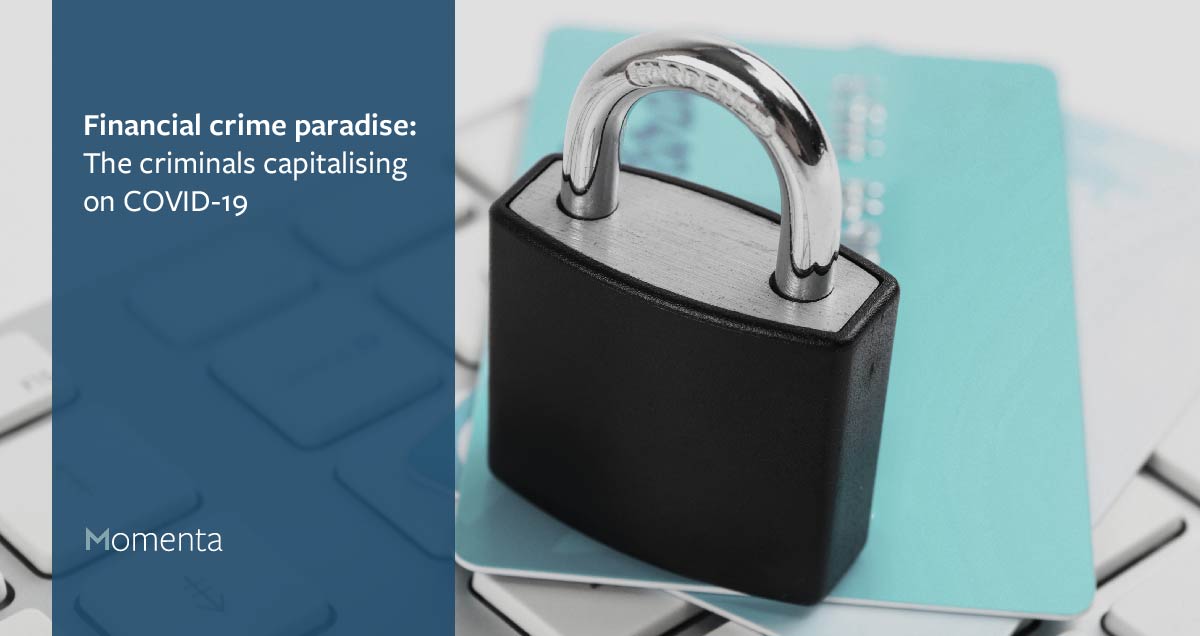Financial crime paradise: The criminals capitalising on COVID-19
Who knew a pandemic would create the optimal opportunity for crime to take place? Well, it most certainly has, and criminals are now capitalising on the panic the pandemic has created, and here is how.
Criminals have used the pandemic to their benefit causing an astounding increase in financial crime conducted. Action Fraud reported that Coronavirus scams cost UK victims over £800k in February 2020. A total of £1.6 million worth of fraud has now been recorded, indicating the market for fraud in the UK is rife. Fraud scams ranged from ordering fake face masks to coronavirus related phishing emails. Criminals have been reported to send out phishing emails supposedly from well-established health bodies such as WHO asking for personal details and transfers. The sad reality is that criminals use the fear coronavirus creates, to attack the weak and they have done so successfully and rather lucratively too.
The UK is not the only one to see an influx of financial crime. Cybercrime in the US has increased significantly as well as in Italy, and Iran. INTERPOL – The International Criminal Police Organisation, has also cautioned the global public releasing a statement about buying medical supplies online and what to look out for to avoid criminals when it comes to telephone fraud as well as phishing emails.
Now more than ever inadequate Customer Due Diligence can cause a rise in financial crime. KYC efforts will have to be increased to ensure that not only those who are eligible will get access to funds but also effectively and efficiently especially with such high demands. Another key issue is that of the nature of the remote vetting and CDD. Limited face to face interactions could affect information gathered and so more caution needs to be implemented when conducting CDD remotely. As they will when conducting verification of key documents and information to identify forgery of any kind.
Are you worried about your organisations AML/KYC systems?
Here are some tips to help you build more resilience in your financial crime strategies against COVID-19 criminals:
- Review your AML/KYC risk assessment in light of potential coronavirus criminals. What controls could be exposed or weak? What key risks could be associated with new coronavirus hacks?
- Are your three lines of defence as resilient as possible and can they provide reassurance from potential COVID-19 criminal attacks?
- Ensure that your whistleblowing procedures are strong especially in remote settings.
- Educate and upskill your workforce. Now more than ever increased training and updates will be required in order to keep up to date with the latest breaches and criminal trends. The more educated your staff, the more likely they are to pick up on potential risks and threats.
- Tech enhanced compliance. AI, machine learning, and automation can help your firm with strengthening compliance systems.
- Update and implement Digital Onboarding. Digital Onboarding will be key during COVID-19 and will remain key when financial institutions use digital identity, to aid financial transactions whilst managing ML/TF risks.
In order to remain compliant, it is important for financial institutions to undertake detailed assessments, putting measures in place to ensure potential risk is minimised. In such a rapidly evolving industry there is a consistently rising demand for specialist knowledge and skillsets.
In parallel, many financial service institutions have opted to reduce headcount adopting a leaner, more cost-effective, workforce model by hiring contingent workforces on a project basis.

